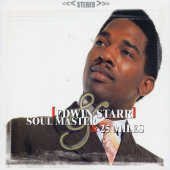|
The Edwin Starr Biography -
|
In 1956, high schooler Hatcher unveiled his latest creation, a doo-wop group called the Future Tones. The vocalists took the talent contest circuit by storm, and took the time to record one song.
The federal government singled out Hatcher in 1960, but not for musical reasons. (Whatever military experiences he had in the U.S. and Germany, they must not have warmed him to the concept of w-a-r....)
Upon his return two years later, the draftee tried to but couldn't resuscitate his Future Tones. So in 1963, he became the newest singer with the Bill Doggett Combo. It was that group's manager who suggested that Hatcher the standout become a "Starr."
Edwin Starr didn't stop mutating there. Amid James Bond mania, he cast himself as "Agent Double-O Soul" and began working at Detroit's Ric Tic label in 1965. The novelty song won him high R&B and pop rankings and nationwide notice--all just icing on the chance to play spy onstage. ;)
The success of "Stop Her on Sight (S.O.S.)" demonstrated his staying power the next year. And when Motown scooped up Ric Tic in 1968, Starr joined his friends the Funk Brothers at the pop-soul giant.
Tricky negotiations kept Edwin's star down low for a while. He declared "I Am the Man for You Baby" that year, but he really hit the big time with "Twenty-Five Miles" in 1969.
While that song penetrated both Top 10s, "I'm Still a Struggling Man" didn't. Its title would characterize Edwin Starr's Motown status as a soul-stirring but less sellable singer than his colleagues.

|
It tore up the charts and fired up a generation as one of the clearest and harshest social indictments ever recorded. So much for Motown going the safe route!
After the follow-up, "Stop the War Now," the Edwin Starr discography included "Funky Music Sho' Nuff Turns Me On" and the 1974 soundtrack, Hell Up in Harlem. How fitting that the initially intended scorer for that movie had been Starr's inspiration, James Brown.
Motown, meanwhile, didn't try too hard to market Starr as soul royalty. After 1975, he moved on to other companies, releasing Free to Be Myself and Afternoon Sunshine along the way.
His turn at the 20th Century label marked another self-revival through disco. With "Contact" and "H.A.P.P.Y. Radio" in the late '70s, he shook up bodies as much as he had souls.
A new decade, a new home across the Atlantic. In quieter moments, Starr enjoyed relaxing with his two dogs or with classic movies. But his stronger, more lasting U.K. support gave him further opportunities to record, perform live, and otherwise connect with the public into the millennium.
At the same time, some of his work celebrated his Motown ties: A tribute to Marvin Gaye, a three-year stint at the Motorcity label, and shows with the Four Tops and Temptations, or Martha Reeves and Mary Wilson. Old hits like "Funky Music Sho' Nuff Turns Me On" and "Twenty-Five Miles" got new spins by dance-oriented groups and featured Starr cameos.
Then, one day, at home in Nottingham, England, Motown's most ferocious of singers suffered a fatal heart attack. The date was April 2, 2003. He was 61.
Perhaps Edwin Starr merely left his body to become one last thing: pure soul.

|